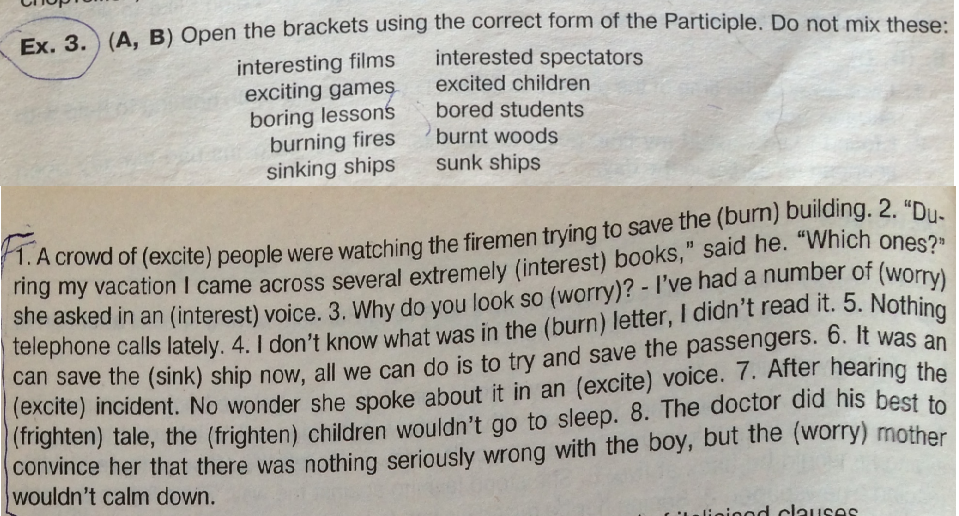Алексей, ну смотрите, ничего сверхсложного тут нет. по сути Вам надо в каждом случае выбрать между причастием, оканчивающимся на -ed или на -ing. два простых правила:
1. если причастие описывает состояние, то форма с -ed "находится в этом состоянии", а форма с -ing "приводит в это состояние". например, interesting - интересный, interested - интересующийся/заинтересованный.
2. Если же причастие описывает процесс, то форма с -ing - "процесс протекает в данное время", а с -ed - "было подвержен этому процессу, но процесс уже завершился. например, burning - горящий, burned - сгоревшей/горелый.
этого должно хватить.
теперь Вам надо просто перевести предложения, и понять какая форма лучше подходит в каждом случае.
если что-то будет непонятно - обращайтесь, постараюсь Вам помочь.
Алексей Приходькоadded a note 9 лет назад

Помогите пожалуйста решить , прошу вас ! Тема: Russian Equivalents of Participles Used as Adverbial Modifiers.
Discussion (6)
1. A crowd of (excite->exciting) people were watching the firemen trying to save the (burn->burning) building. 2. “During my vacation I came across several extremely (interest->interesting) books,” said he. “Which ones?” she asked in an (interest->interested) voice. 3. Why do you look so (worry->worrying)? - I’ve had a number of (worry->worrying) telephone calls lately. 4. I don’t know what was in the (burn->burned) letter, I didn’t read it. 5. Nothing can save the (sink->sinkied) ship now, all we can do is to try and save the passengers. 6. It was an (excite->exciting) incident. No wonder she spoke about it in an (excite->excited) voice. 7. After hearing the (frighten->frightening) tale, the (frighten->frightened) children wouldn’t go to sleep. 8. The doctor did his best to convince her that there was nothing seriously wrong with the boy, but the (worry->worried) mother wouldn’t calm down.
Я правильно ли понял?:)
отлично! только три ошибки:
в 1 люди должны быть возбужденными, а не возбуждающими
а 3 нужно выглядеть взволнованным, а не волнующим
и ещё в 5, я не уверен на 100, но мне кажется что речь идет не о затонувшем, а о тонущем корабле, т.к. с затонувшего людей обычно не спасают. а если бы он был затонувшим, то было бы не sinkied, a sunken, потому что to sink - неправильный глагол, и его вторая и третья форма образуются не добавлением -ed, а изменением самого слова. но тут уж я виноват, т.к. слишком сильно упростил первоначальное объяснение
Игорь, большое спасибо. Завтра сдам и увидимся:)
удачи!
Игорь, благодарю за правильность 100%:)